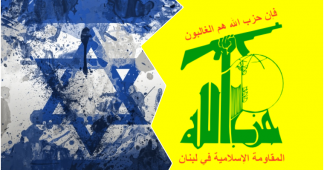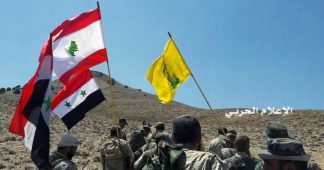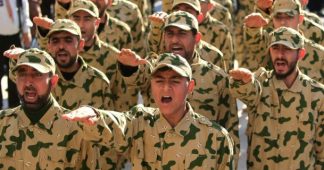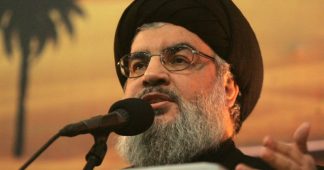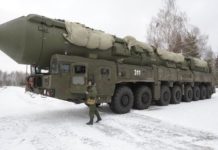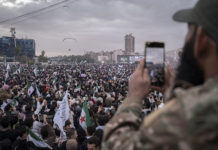March 9, 2020
For the first time in its official existence in 1985, Lebanon’s Hezbollah has now clashed on the battlefield with the Turkish army, one of NATO’s strongest. The face-to-face clash between Hezbollah and the Turkish military took place in the rural area of Idlib where dozens of Turkish service members lost their lives while fighting side-by-side with jihadists and foreign fighters of different nationalities, including al-Qaeda members. The Turkish-NATO army used similar weapons and tactics to Israel. They surprised Hezbollah by using armed drones and precision bombing behind the frontline, killing nine militants and wounding 65 in one single attack. So many Hezbollah militants were killed in one place due to the collapse of the entire building they gathered under, located behind the main battlefield line.
Another factor was the unexpected withdrawal of Russian air coverage at the moment Turkey was sending its Unmanned Combat Air Vehicles (UCAVs) (or Unmanned Aerial System (UAV) better known as armed drones) deep inland, bombing Iran and its allies for the first time. This confrontation has introduced a new military doctrine to Hezbollah militants and has taught them new lessons based on experiences Hezbollah has never been confronted with in the past. Turkey used its UCAVs, TRG-122 satellite-guided rockets, High Mobility Artillery Rocket System (HIMARS) and ground attacks by the Turkish army fighting alongside jihadists. It is most likely what Israel has been threatening Hezbollah with, in the event of war.
Moreover, Israel’s concern about the outstanding Hezbollah night assault capability on Saraqed has a double edge, pinpointing ability and a procedure Hezbollah can successfully carry out against Israel in case of war- thus triggering concern in Israel. Indeed, Israel is increasingly voicing concern about the level of threat posed by Hezbollah’s ‘al-Radwan’ Elite force spread along the borders of Lebanon. Could Israel be planning a similar quick attack against Hezbollah’s forces?
A source within the “Axis of the Resistance” said “during the last war in 2006, Israeli drones covered the sky of Lebanon, providing intelligence information to the Israeli base controller who forwarded the instructions to the F-16s to bomb selective targets. Today we are facing armed drones which can instantly bomb any target considered hostile, without losing precious time or jeopardising the life of the pilot on board of an F-16 when within range of any anti-air missile system Hezbollah could have acquired.”

According to sources within the “Axis of the Resistance”, Israel could “attack Hezbollah’s special forces to destroy this capability deployed along the borders. Israel is aware of the presence of a reserve force of several thousands of Hezbollah Special Forces who regularly rotate after serving in Syria- where they have survived one of the fiercest wars any army could face. Israel would also like to destroy all fortifications and tunnels spread along the borders without necessarily destroying the Lebanese infrastructure to avoid triggering an all-out-war. Therefore, in Israel’s mind, it may be amplifying Hezbollah’s threat to hit it and probably not to praise its performance! Israel is used to campaigning against a specific target or threat long before any attack, to justify its action, notwithstanding the irrelevance of international law in the eyes of Israel and its US ally.”
When the US wanted to invade Iraq, Saddam Hussein was suddenly manufacturing Weapons of Mass Destruction and leading the fifth strongest army in the world. The US destroyed the Iraqi army in days, but US media amplified Saddam’s threat to justify the invasion.
In Syria, Israel is portraying Hezbollah as fighting day and night and having equipped every single one of its militants with the most sophisticated weapons and night vision equipment. Israel is talking about Hezbollah’s increasing missile capability and the danger its Secretary General Sayyed Hassan Nasrallah represents. This is similar to the campaign carried out for several months against Iranian Major General Qassem Soleimani prior to his assassination.
That doesn’t mean Hezbollah is not equipped with tens of thousands of rockets and missiles, and that its Special Forces are not very well trained. It is true that this elite force has gathered a unique experience in the nine years of war in Syria. However, Hezbollah has never initiated a war and will not look to trigger it, though it will not shirk if war is imposed. Hezbollah does not represent a danger to Israel unless it is attacked.
Israel has been threatening Hezbollah with an unprecedented kind of war; the kind of war Hezbollah has been recently exposed to in Idlib. Confronting a NATO army was an unprecedented experience which has taught Hezbollah a lot.
The first lesson learned was the use of mobile phones and the race to post on social media. Hezbollah has a directive similar to that of Israel and most armies around the world to avoid taking mobile phones on the front line. In the last years, Hezbollah leadership failed to impose on all its members the prohibition on mobile phones in Syria, notwithstanding many directives. Sending photos from the frontline is tempting for young Special Forces Hezbollah members to counter misinformation campaigns that the jihadists and rebels perfected.

During the recent battle of Idlib, Hezbollah held its ground and kept control of the eastern part of Saraqeb when the Syrian army pulled back behind its lines following the attack of thousands of jihadists. The Turkish army planned a push towards Talhiya to create a hole in the front and reach al-Hader via Tel el-Eiss. Hezbollah’s mobile phone usage helped Turkey identify the location of Hezbollah’s gathering forces and bomb the Radwan Special Force, killing nine and wounding 66 out of a total of 120, using Turkish drones. The remaining force was able to stop the advance when Fatimiyoun and Zeinabiyoun allies (who also suffered 21 killed) joined them in repelling the attack.
The counter-attack to recover Saraqeb was the most spectacular attack Hezbollah has carried out in 9 years of war. The attack took place at night when more time is needed to perform tasks and yet, in a few hours, the entire city of Saraqeb was liberated.
Israel was surprised how Hezbollah Special Forces attacked at night an entrenched enemy taking their positions in fixed and defendable locations around and within the city. Night fighting without previous reconnaissance and rehearsals is not within the capability of many armies. The dissemination of orders at night, avoiding killing their own men with “friendly fire” when attacking jihadists from different sides of the city, was not an easy task.

Attacking at night reduced the odds of hitting civilians in urban fighting in a city that has become a frontline. Hezbollah Special Forces relied on their navigational skill to find their way within jihadist positions and to clear the path without there being much night vision equipment around. When fighting at night, the jihadists were shooting in all directions and was not until the first morning hours that the jihadists realised the difficult situation they were in and started to pull out.
Hezbollah showed concern for every member of the Special Forces and yet carried out the night attack with new reinforcements arriving the night of the attack with little time available for briefing and familiarisation with the city. Russia was watching the advance of Hezbollah forces and supported it with 27 air attacks to help clear the way.
Fighting jihadists led and instructed by an intelligent NATO army, Turkey offered the opportunity for Hezbollah to learn and acquire new experiences on the Syrian battlefront. It was a live training exercise, simulating the new capabilities of the Israeli army and exploring the best way to hunt down armed drones and find adequate measures to avoid these deadly machines.
The recovery of Saraqeb was a unique school for Hezbollah: Israel cannot ignore the high performance of this quasi-state actor with an irregular but organised and a well-trained army. Tel Aviv can no longer surprise Hezbollah in the next war because it has failed to limit its military knowledge and its warfare capabilities. Hezbollah has many armed drones, tens of thousands of missiles and rockets and is capable of fighting in all weather and day-night conditions. It can take the initiative and counter-attack rather than limit itself to defence as it has done in all Israeli wars on Lebanon.
Hezbollah Special Forces showed on video how, from the battlefield, they film themselves laughing just before their death. Not because they look for a reason to die. On the contrary, extra precautions are taken to limit casualties. But if confronted with death, they leave a video trace of their spirit during the last seconds. Israeli threats against Hezbollah would certainly not shake their morale. The solution is straightforward for the Israeli officials: don’t try a war, even if the objectives are limited.
Proofread by: C.G.B and Maurice Brasher
Copyright © https://ejmagnier.com 2020
Published at https://ejmagnier.com/2020/03/09/a-lesson-from-idlib-for-hezbollah-is-israel-preparing-an-attack/
